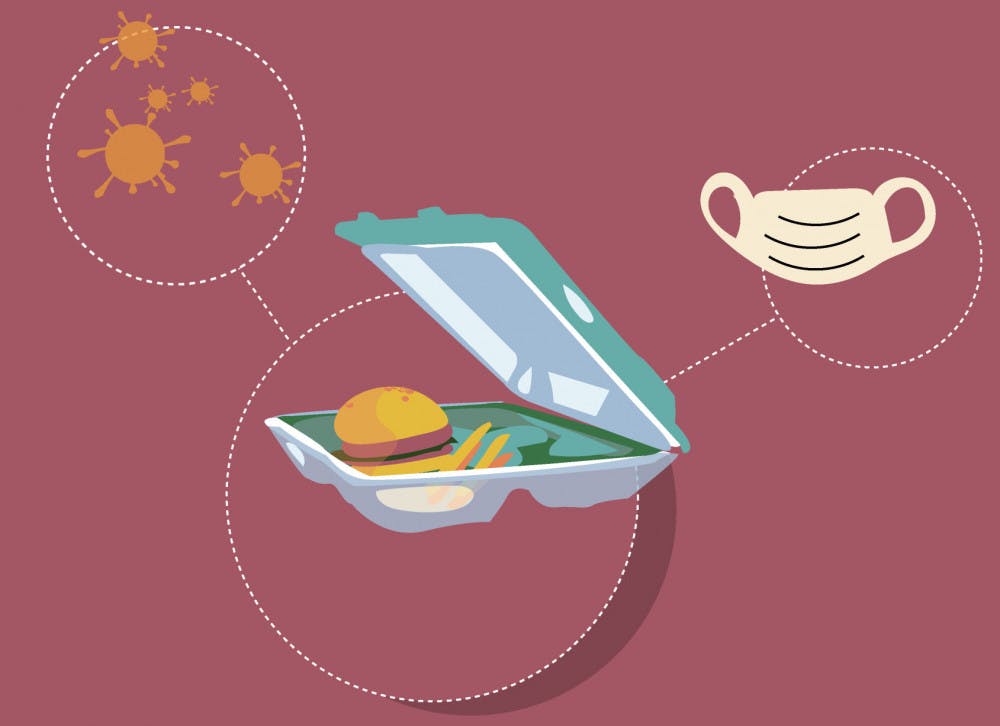Public food service establishments nationwide promised increased cleaning measures during the COVID-19 pandemic. Evidence of safer food preparation from Alachua County inspections data show that they might have kept their word.
This year’s county inspection violation rate has decreased about 23%, according to data from the Department of Business & Professional Regulation’s (DBPR) Division of Hotels and Restaurants, which oversees public food service establishments. The rate has dropped more than it has in almost a decade.
Inspection violation rates have consistently decreased each year since 2015, but the percentage decrease in previous years has usually been smaller — between 3-10%.
“Inspection reports are ‘snapshots’ of the conditions present at the time of an inspection, and may/may not reflect the conditions present in an establishment every day,” wrote DBPR spokesperson Karen Smith Dearden in an email.
There’s no way to know if the pandemic was the sole cause for the phenomenon, but the county’s restaurants seem to be following food safety and sanitation rules more closely this year, making customers less likely to contract food poisoning, according to the Florida DBPR.
The reduction in violations could be associated with restaurants following guidelines better, inspections being conducted when restaurants are cleaner or other factors, Dearden wrote.
Leonardo’s Pizza of Millhopper, located at 4131 NW 16th Blvd., had a perfect inspection in October. The business has had 35 total violations since 2013. Many of the high priority violations found over the years were from cleaning solutions not being strong enough or being stored too close to food.
Dedicated employees and high morale during the pandemic helped Leonardo’s Pizza of Millhopper do well, owner Kyle Cohan said.
The pizzeria was relatively slow to reopen, even as the state became more lenient with building capacities, Cohan said.
The store has 18 tables, but only up to six are used at a time to allow social distancing, Cohan said. Employees are masked for their entire shifts, and tables are sanitized with bleach and ultraviolet light.
Cohan attributed the success of the restaurant following COVID-19 guidelines to the cooperation of the community, whose strong support in complying with the policies has made it a safer experience for everyone involved and has kept the business running.
“One of my sayings is ‘long-term focused and short-term flexible,’” Cohan said. “We’re going to continue to remain as careful as possible.”
In about 3.6% of the Alachua County inspections conducted in October, restaurants completely met inspection standards on the first visit, according to inspection data. This is a slight uptick from around the same time last year, where roughly 3.1% of restaurant inspections had no violations.
State food service inspections, which are unannounced beforehand, focus on safety in food preparation and restaurants’ ability to sanitize. Customers’ cleanliness rarely affects the checkups.
Inspectors, now masked during the pandemic, make sure operating food places don’t violate standard practices such as food temperature control, employee hygiene and clean surfaces to maintain public health and safety. Examples of violations could be a mold-like substance in an ice machine or food debris in a washcloth sanitizing solution.
Inspectors give each inspection a disposition, a category that summarizes the next steps for the restaurant. An establishment can meet inspection standards, require a follow-up inspection, or be forced to temporarily close, depending on the severity of the violations.
Having a smaller food operation makes it easier to do well in inspections, said Pat McCants, co-owner of the bed-and-breakfast Camellia Rose Inn with her husband, Tom.
Camellia Rose Inn at 205 SE Seventh St. consistently meets standards, and inspectors have reported only a total of five violations at the inn since 2013. The more recent violations were relatively mild, and the inn hasn’t had a violation since March 2018.
McCants said the pandemic hasn’t changed most of the cleaning procedures they’ve had in place for the last 14 years. She labels food products like sour cream with the date they’re opened, and she disposes of them within a week. She also changes her food preparation gloves regularly.
Wearing masks and completing a second round of routine disinfecting are the only extra precautions they’ve taken.
The Centers for Disease Control and Prevention recommends that workers stay home if they have coronavirus symptoms, test positive for the virus or come in close contact with someone who tested positive. The agency also suggests that workers wear masks and gloves, wash their hands and cover coughs and sneezes.
The DBPR guidelines haven’t changed to account for the COVID-19 pandemic, so inspectors don’t document whether workers wear masks.
The small size of the inn, which has 10 guest rooms, makes it easier to clean and safer to stay in than mega hotels with elevators, lobbies and other high-traffic spaces, McCants said.
“We are a bed-and-breakfast, and so the two most important things to us are having a good bed, and good, safe breakfast,” McCants said.
Contact Samantha at schery@alligator.org. Follow her on Twitter @SammyChery4276.






